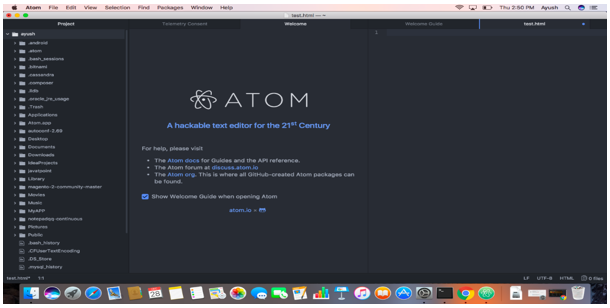This site is intended to provide a resource for chemists using Apple Macintosh computers. The links in the sidebar give access to a variety of resources that I hope you will find valuable.
- Other Tools | PyMDMix - SourceForge
- More Images For Atom C Mac »
- Atom C++ 実行 Mac
- Atom C++ Compiler
- 20+ Best C IDE For Windows, Mac & Linux (2021 Editors)
Have a look at the MacInChemBlog for the latest news, tips and comments.
Anker’s PowerPort Atom PD 4 is a beast of a charger, offering a combined 100 watts between its two USB-C ports and two USB-A ports. It’s great to have the option of a high-powered, dual-USB-C. Free and open source text editor, brought to you by GitHub - Atom. Atom Disable Gpu Mac. C ShaderProgram::disable使用的例子?那么恭喜您, 这里精选的方法代码示例或许可以为您提供帮助。您也可以进一步了解该方法所在类ShaderProgram的用法示例。 在下文中一共展示了ShaderProgram:.
You might also be interested in an article I wrote on my thoughts on scientific software and a listing of open-source cheminformatics toolkits and Open Source Python Data Science Libraries
If you have any comments or suggestions please contact me.
At a glance…
AppleScripts - A variety of Applescripts that might be useful for chemists together with a series of tutorials. For more information on Applescript have a look at the Applescript Resources Page.
iBabel - An easy to use, graphical user interface for the command line file conversion tool OpenBabel. It also includes 2D/3D structure viewers and an interface to ChemSpotlight.
Unix Tips Unix commands for helping deal with very large files
Mobile Science - Finding scientific iPhone (and iPad) applications on the App Store can be a bit hit and miss so I’ve compiled a database of all the apps that I am aware of, feel free to send me details of any that are missing.
Software Reviews - A Growing Collection of Reviews of Scientific Software
Tutorials, Hints and Tips - How to get the best out of scientific software, scripts, Jupyter notebooks and Meetings Reports
Data Analysis Tools - A comprehensive list containing all the Data Analysis Tools available for Mac OS X.
Reference Management - A comprehensive list containing all the Reference Management Applications available for Mac OS X.
Spectroscopy - A listing of Mac compatible apps
Cheminformatics toolkits - A listing of Open-Source Cheminformatics toolkits
Data Science Libraries - A list of useful python libraries for data science
Javascript Molecule Viewers - A list of Javascript/WebGL-based molecule viewers
Last Updated 13 January 2020
Installing Atom
To get started with Atom, we'll need to get it on your system. This section will go over installing Atom on your system as well as the basics of how to build it from source.
Installing Atom should be fairly simple. Generally, you can go to https://atom.io and you should see a download button as shown here:
The button or buttons should be specific to your platform and the download package should be easily installable. However, let's go over them here in a bit of detail.
Installing Atom on Mac
Atom follows the standard Mac zip installation process. You can either press the download button from the https://atom.io site or you can go to the Atom releases page to download the atom-mac.zip file explicitly. Once you have that file, you can click on it to extract the application and then drag the new Atom application into your 'Applications' folder.
When you first open Atom, it will try to install the atom and apm commands for use in the terminal. In some cases, Atom might not be able to install these commands because it needs an administrator password. To check if Atom was able to install the atom command, for example, open a terminal window and type which atom. If the atom command has been installed, you'll see something like this:
If the atom command wasn't installed, the which command won't return anything:
To install the atom and apm commands, run 'Window: Install Shell Commands' from the Command Palette, which will prompt you for an administrator password.
Installing Atom on Windows
Atom is available with Windows installers that can be downloaded from https://atom.io or from the Atom releases page. Use AtomSetup.exe for 32-bit systems and AtomSetup-x64.exe for 64-bit systems. This setup program will install Atom, add the atom and apm commands to your PATH, and create shortcuts on the desktop and in the start menu.
The context menu Open with Atom in File Explorer, and the option to make Atom available for file association using Open with..., is controlled by the System Settings panel as seen above.
With Atom open, click on File > Settings, and then the System tab on the left. Check the boxes next to Show in file context menus, as well as Show in folder context menus. And you’re all set.
Installing Atom on Linux
Other Tools | PyMDMix - SourceForge
You can install Atom on Linux using your distribution's package manager by configuring it to use one of our official package repositories. This will also enable you to update Atom when new releases are published.

Debian and Ubuntu (deb/apt)
To install Atom on Debian, Ubuntu, or related distributions, add our official
package repository to your system by running the following commands:
You can now install Atom using apt-get (or apt on Ubuntu):
Alternatively, you can download the Atom .deb package and install it directly:
Red Hat and CentOS (YUM), or Fedora (DNF)
To install Atom on CentOS, Oracle Linux, Red Hat Enterprise Linux, Scientific Linux, Fedora, or related distributions that use the YUM or DNF package managers, add our official package repository to your system by running the following commands:
You can now install Atom using dnf (or yum depending on your distribution):
Alternatively, you can download the Atom .rpm package and install it directly:
SUSE (zypp)
To install Atom on openSUSE or other distributions that use the Zypp package manager, add our official package repository to your system by running the following commands:
You can now install Atom using zypper:
Alternatively, you can download the Atom .rpm package and install it directly:
Updating Atom
You should consider updating Atom periodically for the latest improvements to the software. Additionally, When Atom receives hotfixes for security vulnerabilities you will want to update your version of Atom as soon as possible.
'Automatically Update' is enabled by default in Core Settings of the Settings View, which will allow Atom to check for updates automatically. If you disable this setting you can update Atom manually.
To perform a manual update:
- Click on the
Atom > Check for Updatemenu item in the menu bar. - Search for
Application: Aboutin the Command Palette and click theCheck nowbutton.
Atom will begin to update if an update is available.
'Automatically Update' is enabled by default in Core Settings of the Settings View, which will allow Atom to check for updates automatically. If you disable this setting you can update Atom manually.
To perform a manual update:
- Click on the
Help > Check for Updatemenu item in the menu bar. - Search for
Application: Aboutin the Command Palette and click theCheck nowbutton.
Atom will begin to update if an update is available.
If you are using Atom's official package repositories, use your distribution's package manager to update Atom. Otherwise, you will need to manually download and install the latest .rpm or .deb package from https://atom.io. For more details, see Installing Atom on Linux.
Portable Mode
Atom stores configuration and state in a .atom directory usually located in your home directory (%userprofile% on Windows). You can however run Atom in portable mode where both the app and the configuration are stored together such as on a removable storage device.
More Images For Atom C Mac »

To setup Atom in portable mode download the zip/tar.gz package for your system and extract it to your removable storage.
Then create a .atom directory alongside the directory that contains atom.exe, for example:
Then create a .atom directory alongside the Atom.app application, for example:
Atom C++ 実行 Mac
Then create a .atom directory alongside the directory that contains the Atom binary, for example:
Portable Notes
Atom C++ Compiler

- The
.atomdirectory must be writeable - You can move an existing
.atomdirectory to your portable device - Atom can also store its Electron user data in your
.atomdirectory - just create a subdirectory calledelectronUserDatainside.atom - Alternatively you can set the
ATOM_HOMEenvironment variable to point wherever you want (you can write a .sh or .cmd script to temporarily set it and launch it from that) - Portable mode installations will not automatically update
Building Atom from Source
The Hacking on Atom Core section of the flight manual covers instructions on how to clone and build the source code if you prefer that option.
Proxy and Firewall Settings
Behind a Firewall?
If you are behind a firewall and seeing SSL errors when installing packages you can disable strict SSL by running:
Using a Proxy?
If you are using a HTTP(S) proxy you can configure apm to use it by running:
20+ Best C IDE For Windows, Mac & Linux (2021 Editors)
You can run apm config get https-proxy to verify it has been set correctly.



